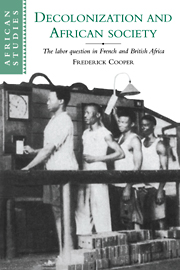Book contents
- Frontmatter
- Contents
- List of tables and figure
- Preface
- List of abbreviations
- Map of French and British colonial Africa
- 1 Introduction
- Part I The dangers of expansion and the dilemmas of reform
- Part II Imperial fantasies and colonial crises
- Introduction
- 5 Imperial plans
- 6 Crises
- Conclusion: modernity, backwardness, and the colonial state
- Part III The imagining of a working class
- Part IV Devolving power and abdicating responsibility
- Conclusion
- Notes
- Bibliography
- Index
- OTHER BOOKS IN THE SERIES
6 - Crises
Published online by Cambridge University Press: 22 February 2010
- Frontmatter
- Contents
- List of tables and figure
- Preface
- List of abbreviations
- Map of French and British colonial Africa
- 1 Introduction
- Part I The dangers of expansion and the dilemmas of reform
- Part II Imperial fantasies and colonial crises
- Introduction
- 5 Imperial plans
- 6 Crises
- Conclusion: modernity, backwardness, and the colonial state
- Part III The imagining of a working class
- Part IV Devolving power and abdicating responsibility
- Conclusion
- Notes
- Bibliography
- Index
- OTHER BOOKS IN THE SERIES
Summary
The late 1940s was the time when the sense of mission in France's and Great Britain's colonial elites was strongest: officials thought they had given empire a new sense of purpose and they had not yet discovered how difficult it was to translate the development concept and its modest level of funding into actual transformations of social and economic systems. The series of strikes and urban disturbances that took place in these years thus had the critical effect of undermining officials' sense of control on their chosen terrain. And because the colonial regimes were so intent on establishing themselves, in their own eyes as much as overseas, as progressive forces, the range of options they had in countering these challenges to their authority was narrowed. They were constrained as well by the power of the converse imagery: Africa's backwardness implied that its people who worked were not committed economically or culturally to wage labor and hence that too much repression might drive them from the workplace altogether. Taken together, these constraints precluded colonial regimes from acting very colonial – from relying too heavily on repressive force external to the social milieu in question.
African labor organizers soon learned the boundaries of maneuver which they had. The modern form of a labor dispute, even where a strike strayed beyond the legal limits which regimes defined for it, gave workers and their organizations considerable scope for action, whereas at the same time disputes which fell outside this form could be repressed brutally.
- Type
- Chapter
- Information
- Decolonization and African SocietyThe Labor Question in French and British Africa, pp. 225 - 260Publisher: Cambridge University PressPrint publication year: 1996

